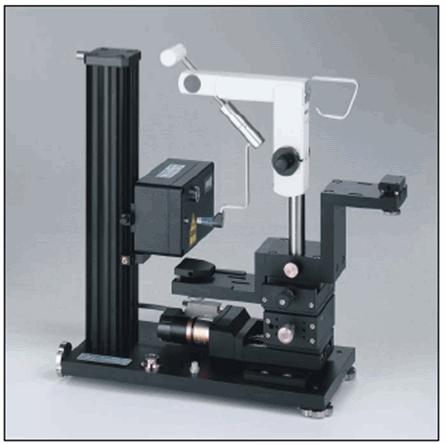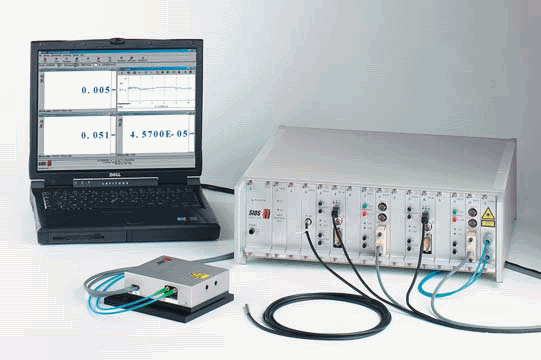|
|



[1빔형(SP)]
[2빔형(SP-DS)]
[3빔형(SP-TR)]
[SP-S]
[LSV-Series]
[Nano 진동측정기]
[Laser Gage Probe]
[Tonometer]
[ 복합 초정밀 측정기]
[SL 02]
[SL 03]
[SL 04]


자료 창고
|
catalog download |
|
레이저스케일 한글 매뉴얼 다운로드 |
|
레이저스케일 소프트웨어 한글 매뉴얼 다운로드 |
|
레이저진동분석기 한글 매뉴얼 다운로드 |
|
Optical-Interference Testing Rig for Applanation Tonometers
PT-Series |
||
|
Design and Operation |
|
Major Performance Features |
|
Our PT-Series optical interference testing rig for applanation tonometers consists of an automated laser based testing device equipped with a USB interface for coupling to a PC, plus signalprocessing software running on standard PCs/notebook computers. Its flexibility of configuration allows its use with various types of tonometers. The buckling force set on the tonometer to be tested is automatically recorded over its full travel. Detecting the limits of the tonometer's travel allows outputting both its buckling force characteristic curve over its full travel and the buckling force at the midpoint of its travel, as stipulated by testing regulations. The force sensor employed is an optical interferometric device with a measurement range of 100 mN and a resolution of 0.01 mN. To test a tonometer, the tonometer is driven up against this force sensor by an electromechanical drive, where the measured buckling force characteristic curve is employed internally for controlling the motions of the drive and detecting the limits of the tonometer's travel. The measured value of the buckling force at the midpoint of the travel is then compared with the prescribed tolerance range and displayed either in green, indicating that it falls within that range, or in red, indicating that it falls outside that range. A complete series of measurements, including printing the calibration certificate, takes less than five minutes, thanks to the fully automated test procedures of the rig. The facilities provided for calibrating its optical interference force sensor using standard weights allow tracing its calibration back to national reference standards. |
• Allows making orientation independent force measurements by laser interferometric force sensor over the full measurement range while • Provides automated test procedures complying with ISO 8612 testing regulations for applanation tonometers (determinations of both buckling forces at the midpoints of their travels and hysteresis). • Diagram of tonometers' buckling-force characteristic curves over their full travels • The first rig to allow the testing of tonometers over the full prescribed temperature range of 15°C to 30°C. • Testing, including setup, takes only about 10 min. • Printout of a calibration certificate • Calibration using standard weights allows tracing its calibration back to national standards. • The rig is portable, and thus may be used onsite e.g. at hospitals or ophthalmologists' offices. • Certification by German calibration authorities has been granted. |
|
|
|
||
|
Technical Data |
|
Applications |
|
Suitable for use with all types of applanation tonometers. Measurement range: 0 ... 10 g (100 mN) Resolution: 1 mg (0.01 mN) 0.1 mg internally Standard calibration error of the force sensor employed: < 0.5 mg (0.005 mN) Test duration: ¡¤¤µ min Laser Safety Class acc. DIN EN 60825-1 2M Dimensions (H x W x D) • Testing rig: 360 mm x 390 mm x 190 mm • Electronics module: 150 mm x 240 mm x 400 mm |
• Conducting metrological accuracy checks on applanation tonometers in accordance with ?11, section 3, MPBetreibV, both in the laboratory and on-site at remote locations. • Testing tonometers for compliance with the EN ISO 8612 testing standard. • Quality control testing during tonometer manufacture. |
|

경기도 화성시 반송동 93-1 위버폴리스 506호, TEL : 031-385-7828, FAX : 031-347-7828
Copyright(c) 2002 CHARM-TECH. All rights reserved.
www.charm-tech.co.kr , E-mail : master@charm-tech.co.kr


